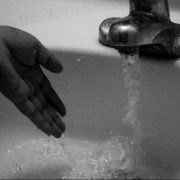What the Biden Administration Might Mean For Water

Community members in Flint, Michigan, gather on February 6, 2016, to discuss the lead contamination crisis. Photo @ J. Carl Ganter / Circle of Blue
When President-elect Joe Biden takes office in January, the change in U.S. leadership will signal a clear break with the previous four years of the Trump administration, especially for environmental policy. How big will the break be? And what will be the priorities for water? Circle of Blue reporter Brett Walton hosted a roundtable discussion with three experts about what a Biden administration might mean for federal water policy.
Guests:
Heather Cooley, the director of research at the Pacific Institute, where she works on a variety of water and climate issues.
Anne Castle, a senior fellow at the Getches-Wilkinson Center for Natural Resources, Energy and the Environment at the University of Colorado Law School. From 2009 to 2014, Castle was the assistant secretary for water and science at the U.S. Department of the Interior.
Eric Schaeffer, the executive director of the Environmental Integrity Project. Schaeffer also led the EPA Office of Civil Enforcement from 1997 to 2002.
Brett writes about agriculture, energy, infrastructure, and the politics and economics of water in the United States. He also writes the Federal Water Tap, Circle of Blue’s weekly digest of U.S. government water news. He is the winner of two Society of Environmental Journalists reporting awards, one of the top honors in American environmental journalism: first place for explanatory reporting for a series on septic system pollution in the United States(2016) and third place for beat reporting in a small market (2014). He received the Sierra Club’s Distinguished Service Award in 2018. Brett lives in Seattle, where he hikes the mountains and bakes pies. Contact Brett Walton











Thanks for sharing What causes poor water quality? It’s not a one-size-fits-all problem. In other words, you can’t point to a single source as the main cause. This issue has accrued over many years due to contamination from agriculture, landfills and more. There are various pollution types and categories that impact water quality.
It’s evident that environmental legislation will help make water cleaner for all. Plans that limit pesticide use have a positive effect. Unfortunately, the Trump administration chose to reduce how many waterways receive protections—and that’s only one protection they rolled back.